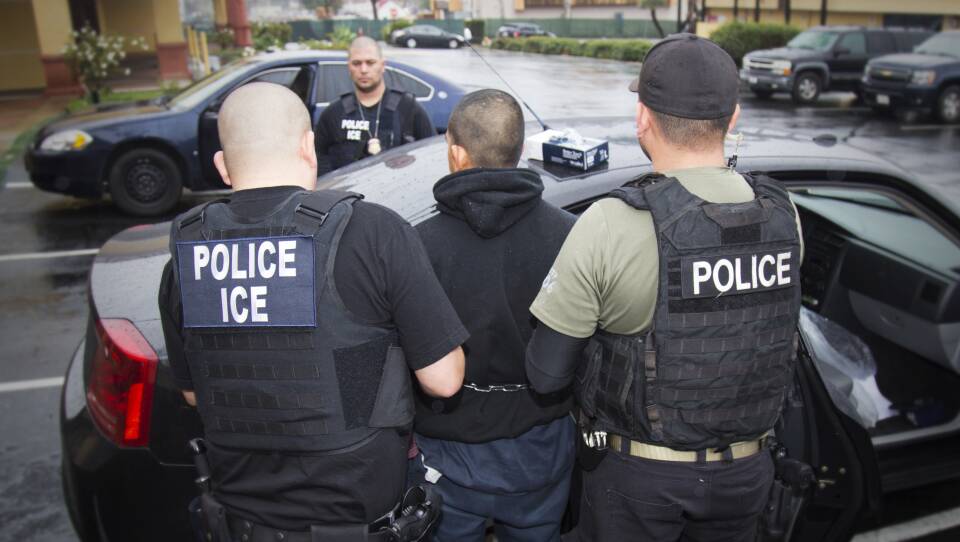Deportations of undocumented immigrants by Immigration and Customs Enforcement have increased nationally over the last three years, according to a new report from the agency. However, during the same time period, deportations have decreased in New England.
ICE officials say the regional decrease in arrests and deportations are down in New England partly because of policies that prevent local law enforcement from coordinating with the agency.
Yesterday’s ICE report dropped on the same day the Boston City Council voted to strengthen the Trust Act, which was passed in 2014 and prohibits the Boston Police Department from coordinating with ICE, and months after the district attorneys for Suffolk and Middlesex counties successfully sued to keep federal immigration agents out of county courthouses at least on a temporary basis.
John Mohan, ICE spokesperson for the Boston field office, which oversees the New England states, told WGBH News that these local efforts to hinder federal immigration enforcement have an “obviously negative impact” on ICE activities. “It becomes that much more difficult to accomplish enforcement,” Mohan said.
Arrest levels in New England were also down, according to the report. Mohan attributed the decrease in both deportations and arrests to the agency’s intensified focus on the Southern Border, which has pulled resources and personnel away from the Northeast. In the last year, New England accounted for less than 2 percent of arrests and less than 1 percent of deportations in the country.
The region has seen a 15 percent decrease in arrests, dipping down to 2,469 in fiscal year 2019, which ran from October 2018 to September 2019. New England saw a 5 percent decrease in deportations, which was down to 2,283 in the same year. While deportations were up 4 percent nationally, arrests were down 10 percent across the country.
Boston City Councilor Josh Zakim, the author of the Boston’s Trust Act ordinance that prohibits coordination between police and ICE, says he is encouraged by the regional trend.
“The president has gone out of his way to use ICE as an agency in a very racist, hateful manner since he took office,” said Zakim. “I'm proud that Boston has joined with other thoughtful progressive cities in putting forth legislation that limits our local law enforcement's cooperation with this hateful and racist Trump agenda.”
ICE officials said the Trust Act and other non-cooperation policies make it harder for ICE to do their jobs.
“This is a public safety issue, not a political issue,” said Marcos Charles, acting field office director for ICE’s office in Boston, in a statement. “It’s only common sense that ICE be able to take custody of criminal aliens in a secure environment such as a jail, instead of sending officers out to attempt the often dangerous task of arresting criminal aliens in residential communities.”
ICE’s report said that the agency has seen in the last three year a national increase in the number of jurisdictions that do not cooperate with its enforcement because of sanctuary city policies and similar legislation. Specifically, the report says there has been an increase in jurisdictions that do not honor ICE detainers.
Suffolk Country DA Rachael Rollins and Middlesex DA Marion Ryan filed a federal lawsuit in April, successfully blocking federal immigration authorities from making arrests at county courthouses, arguing that ICE activity near courthouses prevents witnesses, victims and defendants from participating in the justice system.
Both Somerville Mayor Joe Curtatone and Cambridge Mayor Marc McGovern have vocally supported their own cities’ longstanding sanctuary statuses. Other Massachusetts jurisdictions that have some level of sanctuary status include Chelsea, Springfield, Brookline, Newton, Amherst and Northampton, among others.
Four law enforcement agencies in Massachusetts have formal agreements with ICE, including the sheriff’s offices in Barnstable, Bristol and Plymouth counties, as well as the Massachusetts Department of Corrections.
Bristol Country Sheriff Thomas Hodgson is a long-time collaborator with ICE. He said he isn’t surprised that deportations are down in the region, and he condemns elected officials who support sanctuary policies.
“It's unfortunate that some areas would set up a cover for people who violated the law and suggest this is a place you can come and have a less likely chance of being caught,” said Hodgson.
On the state level, the Safe Communities Act is a widely supported bill before the state House of Representatives. That bill would limit the ability of municipalities to interact with ICE. However, Gov. Charlie Baker has expressed opposition to the policy, saying cities and towns should have the option to cooperate with ICE.





